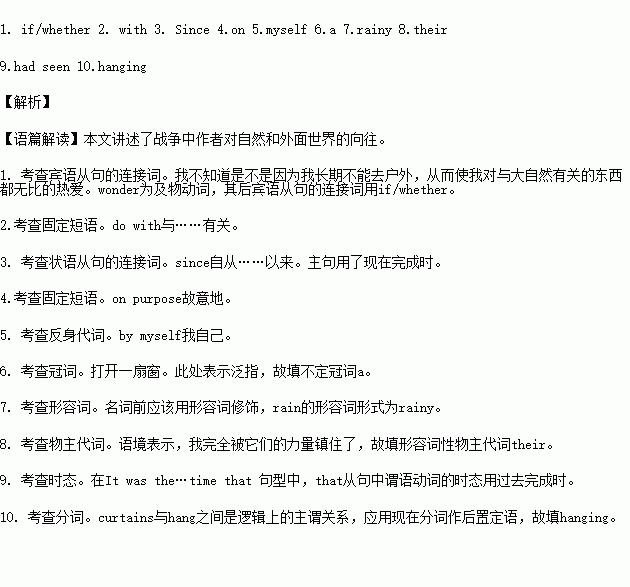题目内容
阅读下面材料,在空白处填入1个适当的单词或括号内单词的正确形式。
I wonder 1 it is because I haven’t been able to be outdoors for so long that I have grown so crazy about everything to do 2 nature. I can well remember that there was a time when a deep blue sky, the song of the birds, moonlight and flowers could never have kept me spellbound. That has changed 3 I was there. For example, one evening when it was so warm, I stayed awake 4 purpose until half past eleven in order to have a good look at the moon by 5 (I). But as the moon gave far too much light, I didn’t dare open 6 window. Another time five months ago, I happened to be upstairs until the window had to be shut. The dark, 7 (rain) evening, the wind, the thundering clouds held me entirely in 8 (they) power; it was the first time in a year and a half that I 9 (see) the night face to face… Sadly, I am only able to look at nature through dirty curtains __10__ (hang) before very dusty windows.
 天天向上一本好卷系列答案
天天向上一本好卷系列答案 小学生10分钟应用题系列答案
小学生10分钟应用题系列答案完形填空
体裁 | 话题 | 词数 | 难度 | 建议时间 |
记叙文 | 我与乐于助人的学生Freddy | 280 | ★★★☆☆ | 17分钟 |
(2017·新课标全国卷II)阅读下面短文,从短文后各题所给的A、B、C和D四个选项中,选出可以填入空白处的最佳选项。
In1973, I was teaching elementary school. Each day, 27 kids 41 "The Thinking Laboratory." That was the __42__ students voted for after deciding that "Room 104" was too 43 .
Freddy was an average 44 ,but not an average person. He had the rare balance of fun and compassion(同情). He would 45 the loudest over fun and be the saddest over anyone’ 46 .
Before the school year 47 , I gave the kids a special 48 , T-shirts with the words "Verbs Are Your __49__" on them. I had advised the kids that while verbs(动词)may seem dull, most of the 50 things they do throughout their lives will be verbs.
Through the years, I’d run into former students who would provide 51 on old classmates. I learned that Freddy did several jobs after his 52 from high school and remained the same 53 person I met forty years before. Once, while working overnight at a store, he let a homeless man 54 in his truck. Another time, he __55__ a friend money to buy a house.
Just last year, I was 56 a workshop when someone knocked at the classroom door. A woman __57__ the interruption and handed me an envelope. I stopped teaching and 58 it up. Inside were the "Verbs" shirt and a __58__ from Freddy’s mother. "Freddy passed away on Thanksgiving. He wanted you to have this."
I told the story to the class. As sad as it was, I couldn’t help smiling. Although Freddy was taken from us, we all 60 something from Freddy.
1.A. built B. entered C. decorated D. ran
2. A. name B. rule C. brand D. plan
3.A. small B. dark C. strange D. dull
4. A. scholar B. student C. citizen D. worker
5.A. speak B. sing C. question D. laugh
6.A. misfortune B. disbelief C. dishonesty D. mistake
7.A. changed B. approached C. returned D. ended
8. A. lesson B. gift C. report D. message
9.A. Friends B. Awards C. Masters D. Tasks
10.A. simple B. unique C. fun D. clever
11.A. assessments B. comments C. instructions D. updates
12.A. graduation B. retirement C. separation D. resignation
13. A. daring B. modest C. caring D. smart
14.A. wait B. sleep C. study D. live
15.A. paid B. charged C. lent D. owed
16. A. observing B. preparing C. designing D. conducting
17.A. regretted B. avoided C. excused D. ignored
18.A. opened B. packed C. gave D. held
19. A. picture B. bill C. note D. diary
20.A. chose B. took C. expected D. borrowed


 o play with you.
o play with you. Easy-On Shoes
Easy-On Shoes Bionic Ears (仿生耳)
Bionic Ears (仿生耳) A Virtual Pencil and Paper
A Virtual Pencil and Paper The Artiphon
The Artiphon